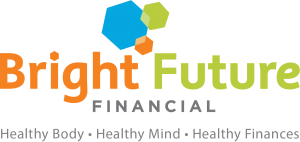Most people want to improve three things in life, their financial health, physical health, and mental health. My philosophy at Bright Future Financial is that we can’t have one without having them all.
Which is why each year I sit with my clients and carry out an annual financial health check-up.
Much like your PT takes you through a checklist to determine your physical health and fitness, your financial health-check can determine the health of your finances and your overall financial outlook.
Being in strong financial health ensures you’re prepared to overcome any of life’s unexpected challenges. You are liberated from financial stress and pressures, and you live freely and confidently as you need.
The Foundations of Strong Financial Health
Budget
You can’t have healthy finances without first designing a budget. Your budget helps you track your expenses, what’s coming out and when – it also raises important questions about your spending habits.
Like, do you really need that magazine subscription to Fishing World when you haven’t read it in 9 months? How many times have you been to the gym lately?
Understanding your actual expenses and putting strategies in place to pay your bills before they’re due are the first step to solid financial health.
Financial Goals
Do you have a savings goal in mind?
Are you saving for your retirement?
Are you planning your wedding?
Are you dreaming to buy a house in Bulimba?
Once you have a solid budget in place, you can integrate your savings goals into your budget and confidently save in the fastest time possible (without sacrificing your everyday commitments).
Debt
Not all debt is bad (your mortgage being a good debt to have!). But, being weighed down by the bad debts will negatively affect your financial health. Think credit cards and car loans. The interest rates are high and it’s easy to get caught out at the end when you’ve been sticking to minimum repayments.
Clear your bad debts and free up your cash for the stuff that matters.
Emergency Fund
The big kahuna that influences your financial health is your emergency fund. Have you set yours up?
If you’re a regular follower of my blog, you’ll notice I talk about emergency funds A LOT. That’s because they are your financial health foundation.
Your emergency fund should equate to roughly 3-6 months of expenses (plus $1,000) sitting in a high-interest (but accessible) savings account. Your emergency fund ensures that should life throw a spanner into the mix; you lose your job, you or your family fall sick or are injured, or your house falls down due to termite damage, you have a healthy emergency fund in your kit to keep your head above water.
How healthy are your finances?
If you’re keen to check out your financial health – download my free checklist.
Please note this is only a guide and isn’t a substitute for financial advice. If you’re concerned about your financial health or you’re looking for guidance to improve your finances, please get in touch to arrange your free consultation.


Leave a Reply
Want to join the discussion?Feel free to contribute!